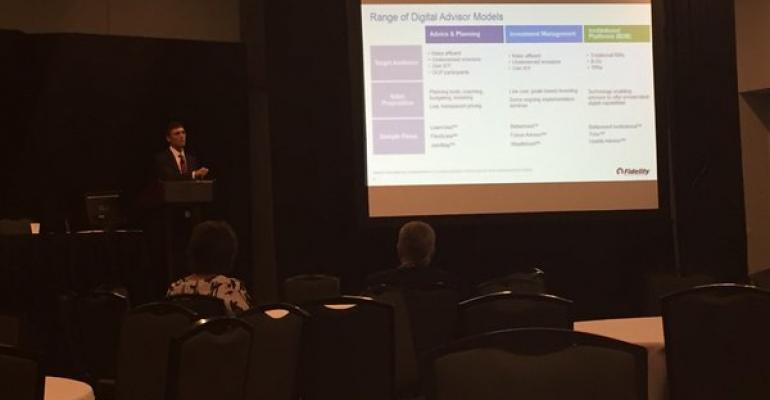Automated investment allocation platforms, the so-called robo advisors, have made a splash in the retail advisory world, but less so among workplace retirement plans.
That’s due to change, said David Canter, an executive with Fidelity in charge of practice management and consulting. Speaking to a group of retirement plan advisors Sunday at the National Association of Plan Advisors conference in Nashville, Canter said the same technology trends taking place on the retail side of the advisory business were coming to the retirement side, particularly as the Department of Labor used the robo advisors as examples of how relatively small savers could still access low-cost advice under its new fiduciary rules for retirement accounts.
The change is prompted by the rise of younger investors who are demanding more “on-demand” access to their financial profile and investments, regardless of whether that’s in a retail brokerage account or a workplace plan. The goal of many of the robo investment platforms is to get a full view of an investor’s accounts in order to make better allocation decisions.
“The key to this is aggregation,” Canter said. “That’s where the puck is going. We all are going to be looking to all of our information in a single place.”
Canter pointed to robo advisor Betterment’s recent move into the retirement plan space with Betterment for Business. “They see it as a market that caters to all the same things they saw in the consumer world,” he said. “Investors who need to get on track, small investors and fee-conscious.”
Patrick McKiernan, a retirement plan advisor with RBC Wealth Management in Pasadena, Calif., said he doubted the robo platforms could make a serious play to replace human advisors for plan sponsors, though he admits there is a need.
McKeirnan said there were lots of small plans out there with a few million dollars. “We’d love to have them,” he said, but his team could not find a way to make it work financially, as they still require time and human effort.
But he said when his team looked at the robo offerings for retirement plans, he couldn’t imagine a chief financial officer and fiduciary making the switch based just on a website. “You need a human to sell these things,” he said. “There has to be face-to-face meetings. There has to be someone the participant can call.”
Jerry Bramlett, managing partner of Redstar Advisors in Austin, took a different view. “Ninety percent of participants never see an advisor,” he said. “We’ve been talking about changing that for 30 years and it hasn’t happened.”
He said his firm was working with Next Capital to bring a robo solution to all of his workplace retirement plan clients.
Bramlett designs the target-date funds that are the default options for the participants, and then brings in Next Capital as an “overlay” of the plan to see where an individual participant needs to tweak the allocations. “It’s no longer just about an age and a retirement date,” he said.




